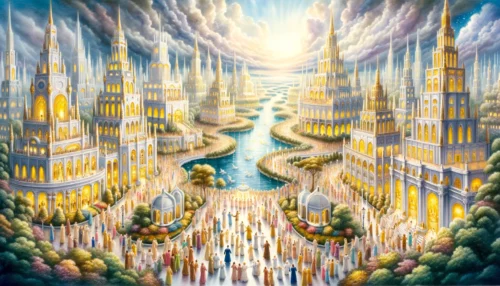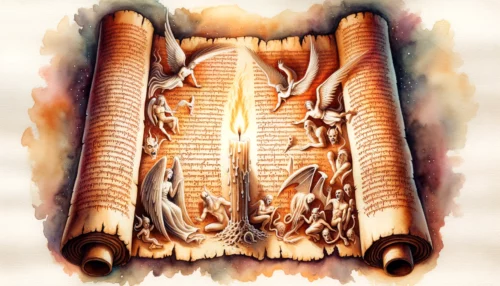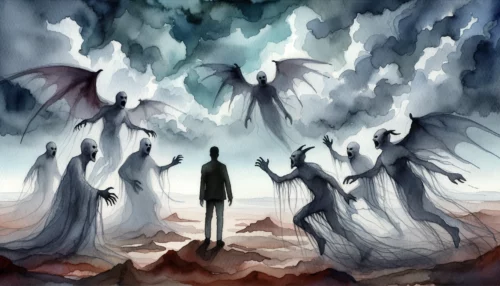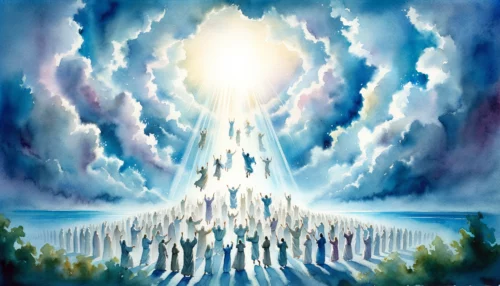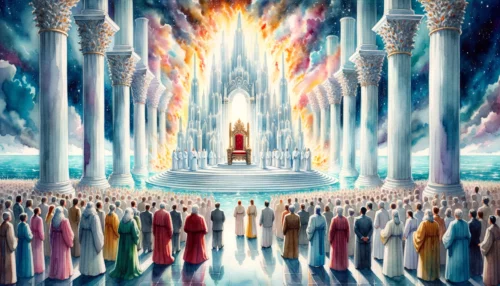Venturing into the heart of biblical teachings, we come across celestial beings often described as God’s messengers, playing pivotal roles in delivering divine edicts and interceding for humanity. Known as angels, they are a common motif across various passages, but among them, a select few carry an even greater mantle – the archangels. These paramount angels, distinguished by their unique roles and profound significance, invite us to further comprehend their place in Christian theology.
Understanding Archangels: Origin and Meaning
Archangels are an intriguing aspect of Christian theology, representing a specific order or class within the broader realm of angelic beings. They are understood to be among the highest-ranking angels in the celestial hierarchy, distinguished by their unique roles and responsibilities.
Derived from the Greek words “arche” meaning “ruling” or “chief”, and “angelos” which translates to “messenger”, the term “archangel” implies a leading or principal messenger. This interpretation fits snugly within the Christian understanding, where archangels are seen as God’s chief messengers, appointed to carry out some of the most significant missions on His behalf.
While the term “archangel” itself does not appear frequently in the Bible, when it does, it carries substantial weight. The title is only used twice in the New Testament, specifically in 1 Thessalonians 4:16 and Jude 1:9. Both times, it is used in association with Michael, who is often considered the chief among archangels.
The book of Daniel (10:13, 21; 12:1), though not explicitly using the term archangel, provides another significant reference to Michael. Here, Michael is described as a “prince” who stands guard over Israel, further emphasizing the high-ranking status typically associated with archangels.
However, while Michael is the only angel explicitly named as an archangel in the canonical Bible, Christian tradition, drawing from other religious texts like the Book of Enoch, often includes Gabriel and sometimes Raphael in the list of archangels. These names are recognized due to their significant roles in biblical narratives.
Gabriel, for instance, is God’s messenger in crucial biblical events, including the annunciation to Mary about the birth of Jesus (Luke 1:26-38). Raphael, on the other hand, while not present in the Protestant Bible, plays a significant role in the Book of Tobit, which is included in the Catholic and Orthodox canons.
The role of archangels extends beyond being mere messengers, to being guardians, warriors, and leaders of other angels. They are seen as divine intermediaries, executing God’s will and expressing His power and authority in the universe.
Archangels are a distinguished order within the angelic hierarchy, marked by their high-ranking roles and responsibilities. The term “archangel” is used sparingly in the Bible, but carries significant weight when it does appear. Michael is the only angel explicitly named as an archangel in the canonical Bible, but Christian tradition often includes Gabriel and sometimes Raphael as well. These archangels are seen as God’s principal messengers, and their roles transcend simple message delivery, encompassing guardianship, leadership, and the execution of divine will.
Biblical References to Archangels
In the context of the Bible, archangels are not explicitly mentioned frequently, but their presence and significance can be clearly discerned in various passages. As previously discussed, Michael is the only angel explicitly described as an archangel in the New Testament.
Michael is mentioned in the book of Daniel (10:13, 21; 12:1) as a ‘prince’ who protects Israel. He also appears in the New Testament, specifically in the book of Jude (1:9), where he contends with the devil over the body of Moses. In the First Letter to the Thessalonians (4:16), it is stated that the Lord will descend from heaven with a commanding call, with the voice of an archangel, which is commonly attributed to Michael.
Gabriel, though not explicitly referred to as an archangel in the canonical Bible, is nevertheless regarded as such in Christian tradition due to his significant roles. He is most prominently featured in the Gospel of Luke (1:19, 26-38), where he announces the births of John the Baptist and Jesus Christ. He is presented as a messenger delivering critical divine announcements, affirming the meaning of “archangel” as a chief messenger.
Raphael is another angel who, despite not being referred to as an archangel in the Protestant Bible, is given this title in some Christian traditions. His primary biblical appearance is in the Book of Tobit, which is recognized in the Catholic and Orthodox canons but not in the Protestant one. In this book, Raphael heals Tobit of his blindness and guides Tobit’s son Tobias on a perilous journey, embodying the roles of both healer and protector.
While these are the main biblical references associated with archangels, there are other passages that, while not directly mentioning archangels, give us insight into their roles and nature. For instance, the book of Revelation includes numerous scenes involving angels carrying out important tasks related to the end times, which could be understood to align with the roles of archangels.
The Bible provides a rich tapestry of references to archangels, directly or indirectly. Michael, the only angel explicitly called an archangel in the New Testament, plays significant roles as a protector and a warrior. Gabriel, while not labeled an archangel in the canonical Bible, is recognized as one due to his key roles as a divine messenger. Raphael, recognized in certain Christian traditions, exemplifies the roles of a healer and protector. These biblical references illuminate the authoritative roles and responsibilities that archangels bear as chief messengers and executors of divine will.g. These accounts underscore the significant roles and responsibilities entrusted to archangels.
The Roles and Significance of Archangels
Archangels, with their elevated status and notable roles, occupy a pivotal position within Christian theology. Let’s examine the specific roles and significance that these celestial beings hold, focusing on the three archangels often recognized in Christian tradition: Michael, Gabriel, and Raphael.
Michael is typically viewed as a warrior and protector. His battles against evil forces, as depicted in the book of Revelation (12:7-9), underscore his role as a celestial warrior. Meanwhile, in the book of Daniel (10:13, 21; 12:1), he is described as a protector of Israel, standing guard against opposing spiritual forces. These roles highlight Michael’s function as a defender of God’s people and a combatant against evil.
Gabriel, on the other hand, is predominantly seen as a messenger. His most notable appearances in the Bible involve him delivering messages of great import. For instance, he announces the coming of John the Baptist to Zechariah (Luke 1:13-20) and the birth of Jesus to Mary (Luke 1:26-38). His role underscores the importance of divine communication, bringing God’s word to mankind at critical junctures in biblical history.
Raphael’s primary role, as derived from the Book of Tobit in the deuterocanonical books, is as a healer and guide. His name means “God Heals”, and indeed, he heals Tobit of his blindness (Tobit 11:7-15) and guides his son Tobias safely through a perilous journey (Tobit chapters 5-12). This illustrates the care and guidance God extends to His people through his celestial messengers.
The significance of archangels in Christian theology extends beyond their individual roles. As high-ranking angels, they personify aspects of God’s character and His interaction with humanity. They symbolize God’s power, authority, communication, protection, healing, and guidance.
Archangels hold distinct and critical roles within Christian theology. Michael, seen as a warrior and protector, combats evil and guards God’s people. Gabriel, as a messenger, delivers God’s word during significant moments. Raphael, recognized from the deuterocanonical books, embodies divine healing and guidance. The significance of archangels extends beyond these roles, as they personify aspects of God’s character and interaction with humanity, symbolizing His power, authority, and care.
Journeying with the Archangels
The exploration of archangels in the Christian tradition opens up a rich tapestry of divine interaction, shedding light on how God communicates, protects, and heals. These celestial beings, while ethereal and sublime, connect in deeply personal ways with our human experience.
- How does knowing the roles of Michael, Gabriel, and Raphael enrich your understanding of God’s character?
- How can the archangels’ roles inspire you in your personal faith journey?
- In what ways can you apply the principles represented by the archangels in your daily life?
In the vast cosmos, amidst the grandeur of divine creation, archangels stand as pillars of God’s steadfast presence. They serve as reminders of His unyielding love, His constant guidance, and His unwavering commitment to humanity. As we journey through life, let us take heart in the knowledge that we are never alone; we are watched over, guided, and loved by a God who speaks, protects, and heals through His heavenly messengers.







